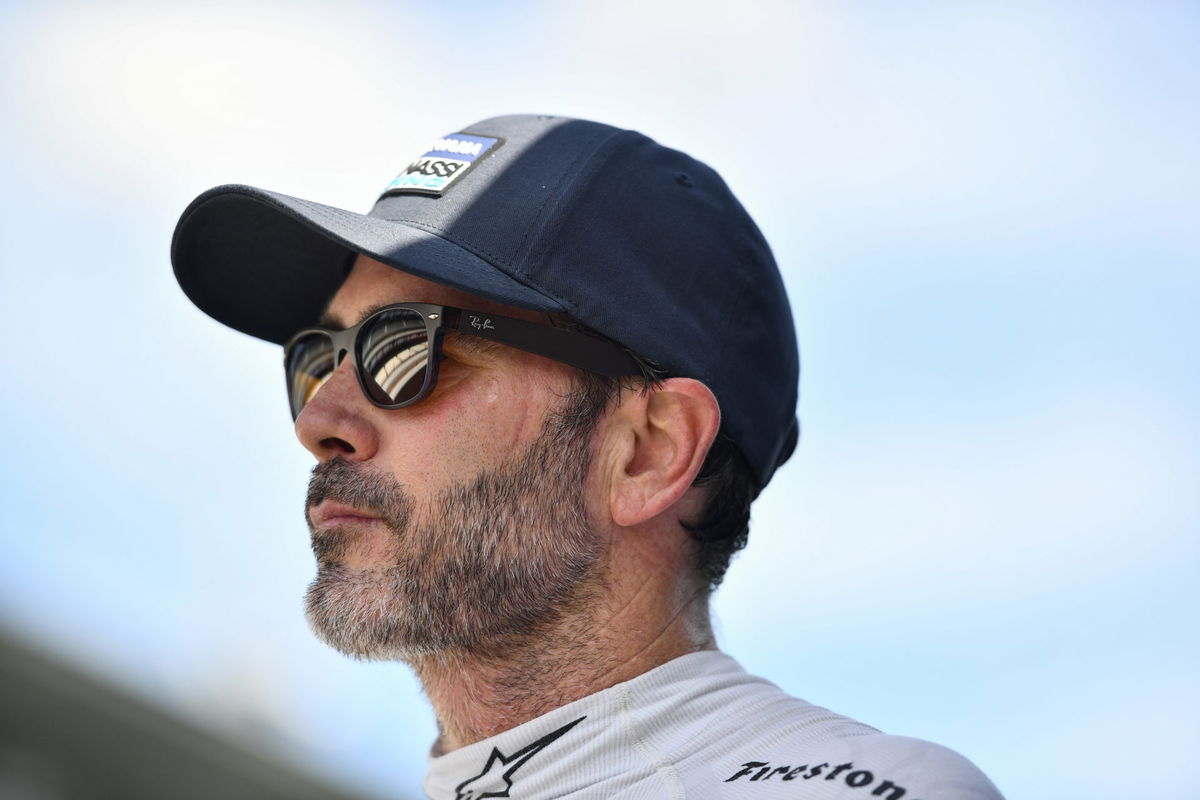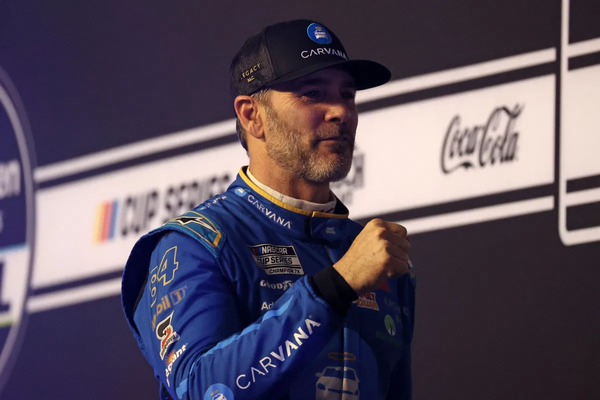
Getty
INDIANAPOLIS, INDIANA – JULY 29: Jimmie Johnson, driver of the #48 Carvana Chip Ganassi Racing Honda, looks on during practice for NTT IndyCar Series Gallagher Grand Prix at Indianapolis Motor Speedway on July 29, 2022 in Indianapolis, Indiana. (Photo by Logan Riely/Getty Images)

Getty
INDIANAPOLIS, INDIANA – JULY 29: Jimmie Johnson, driver of the #48 Carvana Chip Ganassi Racing Honda, looks on during practice for NTT IndyCar Series Gallagher Grand Prix at Indianapolis Motor Speedway on July 29, 2022 in Indianapolis, Indiana. (Photo by Logan Riely/Getty Images)

Getty
INDIANAPOLIS, INDIANA – JULY 29: Jimmie Johnson, driver of the #48 Carvana Chip Ganassi Racing Honda, looks on during practice for NTT IndyCar Series Gallagher Grand Prix at Indianapolis Motor Speedway on July 29, 2022 in Indianapolis, Indiana. (Photo by Logan Riely/Getty Images)

Getty
INDIANAPOLIS, INDIANA – JULY 29: Jimmie Johnson, driver of the #48 Carvana Chip Ganassi Racing Honda, looks on during practice for NTT IndyCar Series Gallagher Grand Prix at Indianapolis Motor Speedway on July 29, 2022 in Indianapolis, Indiana. (Photo by Logan Riely/Getty Images)
Jimmie Johnson may be a seven-time NASCAR champion, but he’s finally admitting where he fell short, and it’s not on the track. His legacy hasn’t always matched the spotlight others enjoyed. In a rare moment of reflection, Johnson opened up about a surprising gap in his career that had little to do with racing itself. It’s a story of dominance, missed connections, and a quiet shift in how he sees his place in the sport. And now, he’s finally ready to own it.
Watch What’s Trending Now!
NASCAR’s golden era was shaped by legends like Richard Petty, Dale Earnhardt Sr., and Jeff Gordon. Petty’s 200 wins and 7 titles made him the sport’s ultimate icon. Earnhardt brought grit and emotion, while Gordon’s No. 24 car and media presence helped NASCAR break into pop culture. Even Dale Jr. became NASCAR’s fan favorite through legacy and charm, despite never winning a title. Meanwhile, Jimmie Johnson, after grabbing seven championships and 83 wins, never reached the same iconic status.
Jimmie Johnson’s silent dominance in modern NASCAR
In his Happy Hour podcast, Kevin Harvick’s candid acknowledgement of Johnson’s place in the elite annals of NASCAR underscored a truth the sport has long wrestled with: the championship glory doesn’t always translate into enduring popularity.
Harvick’s question, “I’m happy that you’re in the NASCAR garage, you’re a part of the sport, because it’s not fair to have a seven-time champion not in there all the time. When you look at Dale Sr. and you look at Richard Petty, I mean, you guys are in an elite group… When you look back at your situation with yourself, Dale Earnhardt Jr., and Jeff Gordon, do you ever wonder why that dynamic didn’t always trend that way for you? Because for me it was very confusing… But I always found that dynamic very interesting. Did you ever think about it that way, or am I just looking into things that I should just keep out of?”
In other sports, dominance is often accompanied by hype; in Johnson’s case, his focus stayed firmly rooted inside the cockpit, leaving the broader narrative unclaimed. Therefore, his response was one of rare candor. “No, you’re right. You’re definitely onto something, and you were years ago when we’d have these chats and you publicly spoke about it as well,” said Johnson, giving the example of merchandise in modern-day NASCAR events.
“I didn’t have maybe the environment that Jeff had with Dale in that passing of the torch or whatever that moment was… I had infrastructure, but all my infrastructure focused on was doing the bare minimum outside of the car so I could do the maximum inside the car. And now as I own a race team and realize the worth of the JJ brand… I walked around in Richmond the other day. There are seven-time shirts for Dale, for Richard, all these other aspects of licensing. I have nothing there. It’s my fault,” Johnson added.

That acknowledgement is striking, given Johnson’s typical calm composure; it’s the kind of self-awareness that comes only in hindsight. Compare that to his Hall of Fame induction, which he described as the first time he fully “savored” his triumphs, rather than chasing the next track.
His lack of branded merchandising at a major venue like Richmond was a strategic choice rooted in prioritizing performance over persona. And Harvick noted that subtle shift Johnson is now able to make. “But that’s the advantage of being the team owner at the racetrack and recognizing your brand. Now you’re in there,” he said, making perfect sense.
Johnson’s evolution toward self-aware ownership is precisely supported by recent developments. In early 2025, Knighthead Capital Management, a $9 billion investment firm, joined as a minority partner in legacy Motor Club, positioning Johnson as the majority owner and enabling greater influence on brand direction and investment.
With Maury Gallagher stepping back into an ambassador’s role and Johnson returning to Charlotte, he is no longer just a celebrated driver but the face and strategist of a growing motorsports empire. He completed the conversation with his open-minded vision.
“I want to build a motorsports property with Legacy Motor Club… Motorsports is a lifestyle, and there is a lifestyle branding opportunity that’s here for Legacy. But before I really get there, I’ve got to make sure that my legacy and my brand is where it needs to be to then have it spill over into the company. And so that’s the journey that I’m on right now. And I’m finally seeing it because I’m on the other side.” And it isn’t just talk; Johnson is fueling the foundation.
LMC’s rebranding in 2023, manufacturer switch to Toyota in 2024, leadership restructuring, and expanded competitive infrastructure are all tangible moves toward strategic transformation. And Jimmie Johnson‘s ambition transcends traditional team ownership in a sport like NASCAR.
Johnson building a culture behind the wheel
Johnson turned his focus from racing to leadership, shaping LMC into a culture-driven organization. He emphasized the importance of trust, accountability, and candid communication, ensuring that both performance and people development go hand in hand.
Reflecting on the early challenges of his team, Johnson said, “Twenty-three, there’s some high spots. Twenty-four was terrible… turn the corner or trying to create the culture that Jimmy Johnson wants and the culture that I want in that building.”
Johnson stressed that embracing discomfort is central to growth, both personally and professionally. “It’s not that it’s personal. It’s gonna grow the individual. It’s gonna grow the company. So, let’s get uncomfortable in those moments,” he stated.
Erik Jones, continuing with the team in 2025, highlighted that the focus isn’t solely on immediate championships but on measurable progress. “This year, we’re more on track to be where we want to be. Obviously, the end goal for Legacy Motor Club is to be a championship team, right? There’s no other goal than that…”
Noah Gragson’s experience underscored the challenges and opportunities within Johnson’s culture. After a difficult 2023 season with LMC, Gragson bounced back with Stewart-Haas Racing in 2024, achieving one top-5 and seven top-10 finishes.
He reflected on the process of resilience, stating, “I still ride the waves of the highs are good and the lows are low and get frustrated like anybody. But to be able to have a bad run the prior week and bounce back the next week and put yourself back on the map. Last year … I don’t think we had a good run. Not one. It wasn’t fun. I’m having more fun.”
This combination of belief, accountability, and independence shapes the identity Johnson is building for Legacy Motor Club.


